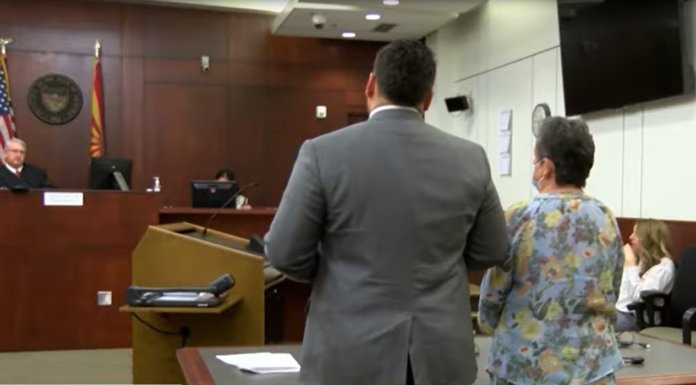(Headline USA) Two women are scheduled to be sentenced Thursday in southern Arizona for their conviction for illegally collecting four early ballots during the 2020 primary election.
Authorities say Guillermina Fuentes and Alma Juarez participated in ballot-harvesting, made illegal by a 2016 state law that barred anyone but a family member or caregiver from returning early ballots for another person.
It’s the only case filed so far by the state Attorney General Mark Brnovich, despite a preponderance of evidence stemming from the state’s audit of Maricopa County that revealed thousands of significant irregularities in the state’s mail-in ballots during the general election in November 2020.
President Joe Biden’s alleged margin of victory in the state was just over 10,000 votes, the narrowest of any state in the 2020 race, while Democrat Mark Kelly’s alleged Senate victory also helped tip the balance of power in Congress.
Authorities say Fuentes ran a sophisticated operation using her status as a well-known Democratic operative in the Arizona border city of San Luis to persuade voters to let her gather and, in some cases, fill out their ballots. But the crime she admitted in court last month does not involve filling out ballots or any broader efforts.
Fuentes and Juarez each pleaded guilty to a charge of ballot abuse, acknowledging they collected early ballots for people who weren’t family members, didn’t live with them or weren’t receiving care from them.
Fuentes’ conviction was a felony, and she could be sentenced to probation or up to two years in prison, while Juarez’s was a misdemeanor. Under Juarez’s plea agreement, if she has cooperated as promised she will be sentenced to probation and prosecutors will not seek jail time.
Three other felony charges against Fuentes were dismissed. Those charges had alleged that Fuentes filled out one voter’s ballot and forged signatures on some of the four ballots she illegally returned for people who weren’t family members.
Investigators have said it appeared Fuentes used her position as a powerful figure in the heavily Mexican American community to get people to give her or others their ballots to return to the polls.
Fuentes and Juarez were seen with several mail-in envelopes outside a cultural center in San Luis on the day of the 2020 primary election, according to reports from investigators. The ballots were taken inside and dropped in a ballot box.
Fuentes was recorded on video by a write-in candidate who called the Yuma County sheriff.
An investigation was launched that day, and about 50 ballots checked for fingerprints, which were inconclusive. The investigation was taken over by the attorney general’s office within days, with investigators collaborating with sheriff’s deputies to interview voters, Fuentes and others.
Although Fuentes was charged only with actions that appear on the videotape and involve just a handful of ballots, investigators believe the effort went much farther.
An investigator for the Attorney General’s Office said there was some evidence suggesting Fuentes actively canvassed San Luis neighborhoods and collected ballots, in some cases paying for them.
Ballot-harvesting has been at the forefront of concerns over vote fraud and abuse in several states, including Wisconsin, where activists are believed to have illegally collected ballots from nursing homes, according to a special-counsel investigation.
In Georgia, a widespread and sophisticated operation for illegal ballot harvesting that was revealed by the bombshell documentary 2,000 Mules relied on the unmanned ballot drop-boxes funded by Facebook CEO Mark Zuckerberg.
Democrats also have pressed lawsuits against the corrupt practice when it worked to their benefit, as in an attempt to reverse the outcome of a 2018 congressional race in North Carolina.
In Arizona, ballot-harvesting was a common get-out-the-vote tactic used by both political parties before the 2016 law, though Democrats used the practice more aggressively. Paying for ballots has never been legal.
The practice, paired with laxer standards for verification through voter ID and signature requirements, has paved the way for an uptick of inelligible voters, including illegal immigrants, deceased citizens and those attempting to vote in multiple locations.
Nonetheless, Democrats have pushed for a broad expansion of it, notably using the coronavirus pandemic in 2020 as a pretense to circumvent state law in several key battleground states.
Arizona’s ban on ballot harvesting was upheld by the U.S. Supreme Court last year.
Adapted from reporting by the Associated Press

